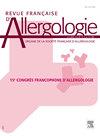The effect of biological agent use on symptoms in patients diagnosed with NSAID-Exacerbated Respiratory Disease (NERD)
IF 0.3
4区 医学
引用次数: 0
Abstract
Introduction
In recent years, biological approaches targeting Type 2 cytokines have emerged as potential treatment options in NSAID-Exacerbated Respiratory Disease (NERD) patients. In this study, we aimed to evaluate the clinical efficacy of omalizumab and mepolizumab in NERD patients with severe asthma via nasal and respiratory symptoms, pulmonary functions and exacerbation status.
Methods
The study was conducted retrospectively in adults with NERD who were initiated on omalizumab and mepolizumab and had been treated with a biologic agent for at least 1 year. Data on lung function test results, eosinophil counts, asthma exacerbation rates, asthma control levels, and Sino-Nasal Outcome Test-22 scores before starting the biological agent were compared with data obtained 1 year after starting the biological treatment.
Results
The study included data from 18 NERD patients, 10 of whom received omalizumab and 8 of whom received mepolizumab. In the NERD group receiving omalizumab, statistically significant changes were observed in terms of clinical improvement in FEV1 values, mean eosinophil counts, annual exacerbation rates, asthma control and SNOT-22 scores after biologic treatment. In patients receiving mepolizumab, significant decreases were found in mean eosinophil counts, annual exacerbation rates and SNOT-22 scores after biologic treatment compared to pre-treatment. Daily oral corticosteroid requirements were significantly reduced in patients receiving both omalizumab and mepolizumab.
Conclusion
In conclusion, the present study results reveal that both omalizumab and mepolizumab treatments are effective in controlling nasal symptoms, reducing the number of asthma exacerbations, and reducing the need for low-dose maintenance steroids in severe asthmatics with NERD.
生物制剂对非甾体抗炎药加重呼吸道疾病(NERD)患者症状的影响
近年来,针对2型细胞因子的生物学方法已成为nsaid加重呼吸系统疾病(NERD)患者的潜在治疗选择。在本研究中,我们旨在通过鼻腔和呼吸道症状、肺功能和加重状态来评估omalizumab和mepolizumab在NERD重症哮喘患者中的临床疗效。方法本研究回顾性研究了成人NERD患者,他们开始使用omalizumab和mepolizumab,并使用生物制剂治疗至少1年。将开始生物治疗前的肺功能检查结果、嗜酸性粒细胞计数、哮喘加重率、哮喘控制水平和Sino-Nasal Outcome test -22评分与开始生物治疗后1年的数据进行比较。该研究纳入了18例NERD患者的数据,其中10例接受了omalizumab治疗,8例接受了mepolizumab治疗。在接受omalizumab治疗的NERD组中,在生物治疗后FEV1值、平均嗜酸性粒细胞计数、年加重率、哮喘控制和SNOT-22评分的临床改善方面观察到具有统计学意义的变化。在接受mepolizumab治疗的患者中,与治疗前相比,生物治疗后的平均嗜酸性粒细胞计数、年加重率和SNOT-22评分显著降低。同时接受omalizumab和mepolizumab治疗的患者每日口服皮质类固醇需用量显著降低。结论本研究结果表明,omalizumab和mepolizumab治疗均可有效控制伴有NERD的严重哮喘患者的鼻腔症状,减少哮喘发作次数,减少低剂量维持性类固醇的需求。
本文章由计算机程序翻译,如有差异,请以英文原文为准。
求助全文
约1分钟内获得全文
求助全文
来源期刊

Revue Francaise d Allergologie
Medicine-Immunology and Allergy
自引率
33.30%
发文量
349
期刊介绍:
La Revue Française d''Allergologie : un véritable forum pour faire connaître des travaux originaux et permettre la diffusion de l''information auprès de toutes les spécialités concernées par les pathologies allergiques. La Revue Française d''Allergologie (8 numéros par an) est au carrefour de nombreuses spécialités - dermatologie, pédiatrie, ORL, pneumologie, ophtalmologie, médecine interne - qui, toutes, ont à traiter des maladies allergiques. Les symptômes des allergies fondés sur des mécanismes communs sont le plus souvent associés et se succèdent chez un même patient. En forte progression depuis 20 ans, les maladies allergiques sont dans l''attente de perfectionnements et d''avancées thérapeutiques qui permettront aux nombreux patients qui en sont atteints de mieux vivre avec leurs allergies. La Revue Française d''Allergologie se veut donc un véritable forum de discussions et d''échanges entre tous les spécialistes confrontés aux pathologies
 求助内容:
求助内容: 应助结果提醒方式:
应助结果提醒方式:


